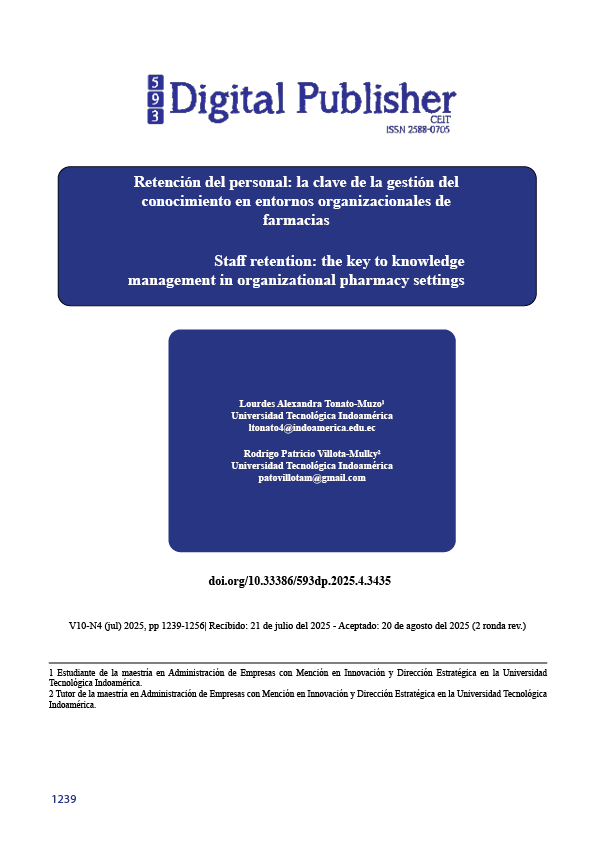Staff retention: the key to knowledge management in organizational pharmacy settings
Main Article Content
Abstract
Staff retention has become a critical factor in knowledge management within organizational environments, particularly in the pharmaceutical sector. This article explores how employee retention influences the preservation and transfer of knowledge within pharmacies—a field that heavily relies on the experience and know-how of its workforce. Through a literature review and practical case analysis, effective strategies for retaining talent and simultaneously promoting knowledge management are identified. The findings suggest that staff retention not only reduces the costs associated with turnover but also strengthens the competitiveness of pharmacies by preserving both tacit and explicit knowledge. This study contributes to the existing literature by providing practical recommendations for implementing retention policies that benefit both employees and organizations.
Downloads
Article Details

This work is licensed under a Creative Commons Attribution-NonCommercial-ShareAlike 4.0 International License.
1. Derechos de autor
Las obras que se publican en 593 Digital Publisher CEIT están sujetas a los siguientes términos:
1.1. 593 Digital Publisher CEIT, conserva los derechos patrimoniales (copyright) de las obras publicadas, favorece y permite la reutilización de las mismas bajo la licencia Licencia Creative Commons 4.0 de Reconocimiento-NoComercial-CompartirIgual 4.0, por lo cual se pueden copiar, usar, difundir, transmitir y exponer públicamente, siempre que:
1.1.a. Se cite la autoría y fuente original de su publicación (revista, editorial, URL).
1.1.b. No se usen para fines comerciales u onerosos.
1.1.c. Se mencione la existencia y especificaciones de esta licencia de uso.
References
Acosta, V., & Prieto, E. (2019). “Impacto del ciclo de vida útil en la rotación de personal en empresas de retail en México.” (“Impacto del ciclo de vida útil en la rotación de personal en empresas ...”) (“(PDF) Factores que originan la rotación de personal en las empresas ...”) Revista Global Negotium, Vol. 2. https://publishing.fgu-edu.com/ojs/index.php/RGN/article/view/81/81
Alvarado, N., & Morejón, M. (2023). “GESTIÓN DEL TALENTO HUMANO Y SU RELACIÓN CON EL DESEMPEÑO LABORAL: MUNICIPIO PEDRO CARBO.” (“Ciencia y Desarrollo. Universidad Alas Peruanas - Dialnet”) (“Registro de Citas”) Ciencia y Desarrollo. Universidad Alas Peruanas. https://revistas.uap.edu.pe/ojs/index.php/CYD/article/view/2507
Ames, R. (2021). Factores de atracción y retención del talento humano y su influencia en el compromiso organizacional. (“(PDF) Factores de atracción y retención del talento humano y su ...”) (“(PDF) Factores de atracción y retención del talento humano y su ...”) Económicas CUC. https://doi.org/https://doi.org/10.17981/econcuc.43.1.2022.Org.1
Burgos, E. (2023). Retención de Talentos a través de Satisfacción Laboral. Universidad Indoamérica. https://repositorio.uti.edu.ec/bitstream/123456789/6333/1/BURGOS%20SAENZ%20ALAN%20EMILIO.pdf
Chiavenato, I. (2020). Gestión del talento humano (5.ª ed.). McGraw-Hill.
González, M., & Ramírez, L. (2020). Gestión del conocimiento y retención del talento en organizaciones de salud. Revista Innovar en Gestión, 30(2), 55–68. https://doi.org/10.15446/innovar.v30n2.84752
Gallup, (2019). How to Improve Employee Engagement in the Workplace. Recuperado de https://www.gallup.com/workplace/285674/improve-employee-engagement-workplace.aspx
Huaraca, C., De la Cruz, M., Valdez, J., Li, L., & Melgarejo, N. (2023). Estrategias de retención del talento en un Contexto Internacional. Ciencia Latina Revista Científica Multidisciplinar, Vol. 7. https://doi.org/https://doi.org/10.37811/cl_rcm.v7i2.5741
López, A., & Cedeño, J. (2024). Conocimiento tácito y rotación de personal: un reto para la sostenibilidad organizacional. Ciencia Latina Revista Científica Multidisciplinar, 8(3), 144–160. https://doi.org/10.37811/cl_rcm.v8i3.14999
Mathur, S., & Srivastava, D. N. (2024). Talent Management Practices and Employee Retention: Mediating Role of Organization Commitment. Migration Letters, 21(S2), 302–317.
Meneses, K. (2019). ESTRATEGIAS DE ATRACCIÓN Y RETENCIÓN DEL TALENTO HUMANO PARA DISMINUIR LA ROTACIÓN DE PERSONAL. (“ESTRATEGIAS DE ATRACCIÓN Y RETENCIÓN DEL TALENTO HUMANO PARA DISMINUIR ...”) (“ESTRATEGIAS DE ATRACCIÓN Y RETENCIÓN DEL TALENTO HUMANO PARA DISMINUIR ...”) UNIVERSIDAD MILITAR NUEVA GRANADA. https://core.ac.uk/download/pdf/286064376.pdf
Nolazco, F., & Rodríguez, D. (2020). Los tres pilares para la retención del talento humano en una empresa de servicios generales. (“Título: Propuesta de Tres Pilares para Retener Talento ... - Studocu”) (“Redalyc.Los tres pilares para la retención del talento humano en una ...”) INNOVA Research Journal, 5(1), 269–280. https://doi.org/10.33890/innova.v5.n1.2020.1240
Nonaka, I., & Takeuchi, H. (2021). The Wise Company: How Companies Create Continuous Innovation. Oxford University Press.
Pérez, R. (2023). Estrategias de Retención del Talento en la Administración de Recursos Humanos. (“Estrategias de Retención del Talento en la Administración de Recursos ...”) (“Estrategias de Retención del Talento en la Administración de Recursos ...”) BUSINESS INNOVA SCIENCES (BIS), Vo. 4. https://doi.org/https://doi.org/10.5281/zenodo.12747114
Rincón, P., & Rodríguez, C. (2022). Retención del talento y gestión del conocimiento en empresas latinoamericanas. Estudios Gerenciales, 38(164), 289–301. https://doi.org/10.1016/j.estger.2022.05.004
Rodríguez, P. (2020). EL IMPACTO QUE CAUSA LA ALTA ROTACIÓN DE PERSONAL EN LAS ORGANIZACIONES. UNIVERSIDAD MILITAR NUEVA GRANADA. https://repository.umng.edu.co/server/api/core/bitstreams/3a20ad24-a5de-48e5-9f75-441839656c0c/content
Romero, R., & Toscano, J. (2024). Factores e impactos de la rotación de personal en la industria de Latinoamérica. (“Factores e impactos de la rotación de personal en la industria de ...”) (“Factores e impactos de la rotación de personal en la industria de ...”) Revista Torreón Universitario, Vol. 13. https://doi.org/https://doi.org/10.5377/rtu.v13i36.17639
Solís, B., Guzmán, I., Mediana, M., & Galván, D. (2024). Impacto de la Rotación de Personal en los Costos y la Rentabilidad Empresarial. Ciencia Latina Revista Científica Multidisciplinar, Vol. 8. https://doi.org/https://doi.org/10.37811/cl_rcm.v8i6.15347
Soto, K., & Vera, D. (2023). Estrategias de mentoría para la transferencia de conocimiento tácito en organizaciones. Revista Global de Negocios, 11(1), 25–40. https://doi.org/10.33818/rgn.2023.11.1.325
Taruchaín, L., & Revelo, R. (2023). Gestión de la Atracción y Retención del Talento Humano en el Siglo XXI: una Revisión Bibliográfica Sistemática de la Literatura Latinoamericana. (“(PDF) Gestión de la atracción y retención del talento humano en el ...”) (“(PDF) Gestión de la atracción y retención del talento humano en el ...”) 593 Digital Publisher, Vol. 8, 749–756. https://doi.org/doi.org/10.33386/593dp.2023.3-1.1920



